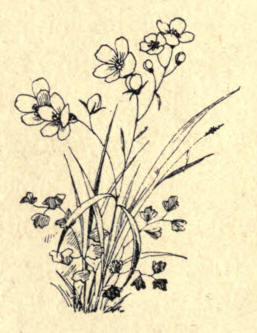|
WE remained over Sunday at
the fort. Father held service, and Monday morning saw us away, mounted on
fresh horses, which had been provided by the gentlemen in charge of the
fort.
Our course was now more
northerly, and the country increased in interest as we travelled. Away in
the distance to the south and west, we caught glimpses of the winding valley
of the big river. Around us, on every hand, were beautiful lakes with
lawn-like banks; gems of prairie with beautiful clumps of spruce and poplar,
and birch and willow artistically intersecting them; great hills, and broad
valleys, and gently rippling streams; a cloudless sky; an atmosphere
surcharged with ozone above us; good horses under us; father, and guide, and
myself all thoroughly optimistic in thought and outlook. No wonder that I,
in the full tide of strength, and health, and youth, was fairly intoxicated
amid such surroundings! Father was only a little more sober or a little less
"drunk" than I was. We
were travelling steadily and fast, and amused ourselves by locating farms
and homesteads, and villages and centres of population, and running
imaginary railroads through the country as we trotted and cantered from
early morn until night, through those never-to-beforgotten lovely August
days of 1862. For food
we had pemmican and dried meat.
Occasionally we shot chickens or ducks, but the
distance we had to travel and the limited time father had at his command
forbade us doing much shooting while pemmican or dried meat lasted.
We rode over the Two Hills; we galloped along
the sandy beach of Sandy Lake; we saw Frog Lake away to the right; a few
miles farther on we crossed Frog Creek, then Moose Creek, then the Dog Rump.
Here I missed my first bear. He was down in a
deep ravine, almost under me, and, as is usual with a "tenderfoot" at such a
time, I shot over him, and as my gun was a single-barrelled muzzle-loader,
the bear had plenty of time to disappear into the thick brush down the
ravine. We had no time to follow him.
On we went, over hills and across broad plains,
thickly swarded with pea-vine and rich grasses, passing Egg Lake to the
left. Early the third
day we came to Saddle Lake, on the north side of which we found a camp of
Cree Indians. Some of
these belonged to White-fish Lake, and were nominally Christians. Others
were wood and plain Indians, still pagan, and without any settled home, but
all glad to see us. Most of the leading men and hunters had gone across the
river and out on to the plains for a hunt.
From these people we learned that Mr. Steinhauer
and his people, still at the Mission, contemplated a trip out to the plains
for provisions, and that they and these were but awaiting the return of the
hunters to this camp to decide from the report they would bring as to the
direction of their trip. This determined father to hurry on to White-fish
Lake, and catch Mr. Steinhauer at home if possible.
We spent about three hours with this camp, and
had lunch in one of the tents, where we were the guests of Mrs. Hawke, who
very kindly loaned father a fresh horse, a fine animal, to take him to the
Mission. Father held a
short service, and late in the afternoon we started on, two of the
patriarchs of the camp accompanying us to where we stopped for the night.
Many were the questions they asked, long was the
talk father held with them, and it was late when we rolled into our blankets
and went to sleep. Early next morning we parted company with our venerable
friends and continued our journey.
Our course lay almost north-east. We were
entering the fringe of the forest lands of the north country. We were going
farther out of the course of the war-paths of the plain Indians. The more
bush and forest, the less danger from these lawless fellows.
A plain Indian dreads a forest, does not feel at
home in it, and this was the reason for the selection of White-fish Lake as
a mission centre, a place where the incessant watchfulness and unrest (the
prevailing condition of the times) on the plains south of the Saskatchewan
might, for the time, at least, be largely laid aside. On into this
thickening forest-land we trotted, a narrow bridle-path our road.
Water became abundant, and mud correspondingly
so. Within a few miles
of the Mission we came to the thickly wooded banks of a stream where we had
to swim our horses. Here we met some Indians who were starting out on a
moose hunt, and, to my astonishment, one of them seemed to be speaking
English—at least I thought so. He was shouting "Dam, dam," but like all men
who presume on a too hasty judgment, I was mistaken, for the old fellow was
only calling to his horse, "Tom, Tom," urging him to swim across the stream.
With his accent, "t" was "d".
Resaddling and galloping on, early in the
afternoon we came to the Mission, and found Mr. Steinhauer and family well;
and as we had heard at Saddle Lake, Mr. Steinhauer and people were making
preparations for a trip out to the plains for provisions.
As with everybody in the West in those days,
their storehouse and market was the buffalo, which, after all, was
exceedingly precarious, for pemmican, dried meat, or any kind of provision,
and even fish, were alike at a premium when we arrived at White-fish Lake,
and it behoved all parties, both residents and visitors, to move somewhere
very soon.
 |
